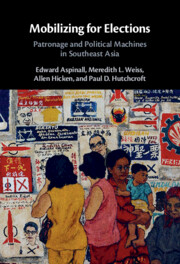Book contents
- Mobilizing for Elections
- Mobilizing for Elections
- Copyright page
- Contents
- Figures
- Tables
- Acknowledgments
- Terms and Acronyms
- 1 Patronage and Political Machines in Southeast Asia
- 2 Historical and Institutional Foundations
- 3 Mobilization Networks and Patterns of Patronage
- 4 Targeting Individuals: Don’t You Forget about Me
- 5 Targeting Groups
- 6 Hijacked Programs
- 7 Patronage and Identity
- 8 Subnational Variation
- 9 Conclusion
- Book part
- Bibliography
- Index
2 - Historical and Institutional Foundations
States, Parties, Constituencies for Patronage, and Electoral Systems
Published online by Cambridge University Press: 04 August 2022
- Mobilizing for Elections
- Mobilizing for Elections
- Copyright page
- Contents
- Figures
- Tables
- Acknowledgments
- Terms and Acronyms
- 1 Patronage and Political Machines in Southeast Asia
- 2 Historical and Institutional Foundations
- 3 Mobilization Networks and Patterns of Patronage
- 4 Targeting Individuals: Don’t You Forget about Me
- 5 Targeting Groups
- 6 Hijacked Programs
- 7 Patronage and Identity
- 8 Subnational Variation
- 9 Conclusion
- Book part
- Bibliography
- Index
Summary
This chapter provides a historical-institutional account of the emergence of distinct electoral mobilization regimes in Southeast Asia. It does so by surveying the sequencing and development of the bureaucracy, parties, and electoral systems across Indonesia, Malaysia, and the Philippines. In the Philippines, the focus is the early twentieth century, when US colonial authorities introduced elections before establishing a strong bureaucracy, enabling elite families to capture power and build local machines. Malaysia's regime is traced to its transition to independence and rise of an ethnically defined party that subordinated the bureaucracy to its patronage purposes. And in Indonesia, the key era is authoritarian rule in 1966–98, when patronage was centralized in the bureaucracy and parties marginalized. Over time, electoral and bureaucratic reform have tempered, but not displaced, those legacies. Only through comparative analysis of historical patterns of state–society relations, the chapter shows, can we understand cross-national differences in patronage and the networks through which it flows. The chapter also provides key context for readers unfamiliar with Southeast Asia.
Keywords
- Type
- Chapter
- Information
- Mobilizing for ElectionsPatronage and Political Machines in Southeast Asia, pp. 31 - 66Publisher: Cambridge University PressPrint publication year: 2022



